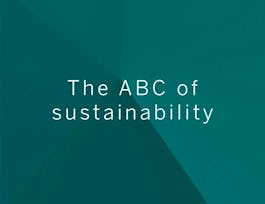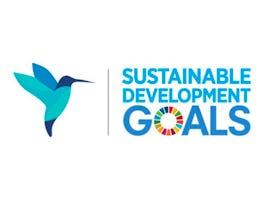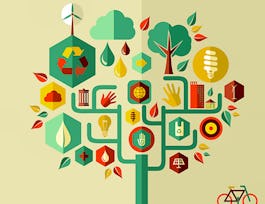This course introduces the academic approach of Sustainability and explores how today’s human societies can endure in the face of global change, ecosystem degradation and resource limitations. The course focuses on key knowledge areas of sustainability theory and practice, including population, ecosystems, global change, energy, agriculture, water, environmental economics and policy, ethics, and cultural history.


Introduction to Sustainability
Taught in English
Some content may not be translated
147,263 already enrolled
(2,542 reviews)
Details to know

Add to your LinkedIn profile
25 quizzes
See how employees at top companies are mastering in-demand skills


Earn a career certificate
Add this credential to your LinkedIn profile, resume, or CV
Share it on social media and in your performance review

There are 8 modules in this course
In this module, you will become familiar with the course, your classmates, and the learning environment. The orientation also helps you obtain the technical skills required for the course. In the introduction, we will examine some of the central ideas that underpin the Earth as a system, and their consequences for environmental sustainability.
What's included
5 videos5 readings3 quizzes1 plugin
In this module, we will see how human populations have evolved over time and get a sense of where the next century of change will take us.
What's included
5 videos1 reading4 quizzes
In this module, we will see that the Earth faces many environmental pressures that result from human exploitation of natural resources. We will also look at the issue of climate change.
What's included
8 videos1 reading4 quizzes1 peer review
In this module, we will look at energy use. We will also consider what the trend of energy use means for the planet, and how we might transition to a more sustainable pattern of use.
What's included
8 videos1 reading4 quizzes
In this module, we will explore the connection between water and food, and see what will be required to feed the planet over the course of the century.
What's included
6 videos1 reading3 quizzes
In this module, we will examine some of the common tools used by policy-makers, and some of the forces that shape (or misshape) policy.
What's included
9 videos1 reading3 quizzes1 peer review
In this module, we will examine what tools are available to measure sustainability. Finally, I will make some predictions on global sustainability for the 21st century, based on the models we have spoken about in this course and the trends that have been observed in the early part of this century.
What's included
7 videos1 reading3 quizzes1 peer review
Welcome to the end of the course! This module has a final, comprehensive quiz that covers all of the topics that we’ve seen in the previous seven modules. You’ll want to be familiar with the goals and objectives, key phrases, concepts, and guiding questions from the earlier modules to do well on this final quiz.
Instructor

Recommended if you're interested in Environmental Science and Sustainability

Campus BBVA

Coursera Project Network

Erasmus University Rotterdam
Why people choose Coursera for their career




Learner reviews
Showing 3 of 2542
2,542 reviews
- 5 stars
80.78%
- 4 stars
16.26%
- 3 stars
1.61%
- 2 stars
0.43%
- 1 star
0.90%

Open new doors with Coursera Plus
Unlimited access to 7,000+ world-class courses, hands-on projects, and job-ready certificate programs - all included in your subscription
Advance your career with an online degree
Earn a degree from world-class universities - 100% online
Join over 3,400 global companies that choose Coursera for Business
Upskill your employees to excel in the digital economy
Frequently asked questions
Access to lectures and assignments depends on your type of enrollment. If you take a course in audit mode, you will be able to see most course materials for free. To access graded assignments and to earn a Certificate, you will need to purchase the Certificate experience, during or after your audit. If you don't see the audit option:
The course may not offer an audit option. You can try a Free Trial instead, or apply for Financial Aid.
The course may offer 'Full Course, No Certificate' instead. This option lets you see all course materials, submit required assessments, and get a final grade. This also means that you will not be able to purchase a Certificate experience.
When you purchase a Certificate you get access to all course materials, including graded assignments. Upon completing the course, your electronic Certificate will be added to your Accomplishments page - from there, you can print your Certificate or add it to your LinkedIn profile. If you only want to read and view the course content, you can audit the course for free.
You will be eligible for a full refund until two weeks after your payment date, or (for courses that have just launched) until two weeks after the first session of the course begins, whichever is later. You cannot receive a refund once you’ve earned a Course Certificate, even if you complete the course within the two-week refund period. See our full refund policy.



